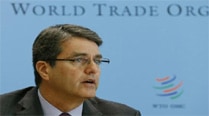 PM Narendra Modi had told the House that since the Centre started using “technology” and “Aadhaar” in the last two-and-half years, it had managed to weed out some 4 crore fake ration cards.(File)
PM Narendra Modi had told the House that since the Centre started using “technology” and “Aadhaar” in the last two-and-half years, it had managed to weed out some 4 crore fake ration cards.(File)
Activists for food security and transparency on Tuesday questioned Prime Minister Narendra Modi’s statement in Lok Sabha in February that nearly 4 crore fake ration cards were deleted in the last two-and-a-half years with the help of technology and Aadhaar. The activists said that there is no evidence to back the Prime Minister’s claim, as neither is the information available publicly, nor were the relevant authorities able to provide it under the Right to Information.
Modi had told the House that since the Centre started using “technology” and “Aadhaar” in the last two-and-half years, it had managed to weed out some 4 crore fake ration cards. Anjali Bhardwaj, economist and anti-corruption and transparency activist, filed an RTI request with the Prime Minister’s Office (PMO) seeking state-wise break-up of 4 crore ration cards that were found fake, as Modi had stated. The PMO forwarded this to the Department of Food & Public Distribution (DFPD), which claimed that the state-wise list is available on the department’s website and forwarded the request for details to each state, she said.
But what the DFPD website has, Bhardwaj said, is the total number of ration cards that have been deleted since 2006. The list was updated on February 16, 2016. The total number of “bogus/ineligible” ration cards deleted during this period was 626.82 lakh. The figure pertains to a decade, rather than the two-and-a-half-year period mentioned by Modi, and predates Aadhaar, Bhardwaj said. Modi had told the House that due to cancelled ration cards in the previous two-and-a-half years, Rs 14,000 crore meant for the poor but consumed by the middlemen is now back into the mainstream and sent to the poor.
Nikhil Dey of Mazdoor Kisan Shakti Sangathan said at a press conference that after Rajasthan made Aadhaar’s biometric authentication mandatory for getting ration since September 2016, at least 1 crore people are losing their entitled ration (from PDS) regularly. Using the state government’s data, Dey said that during its best month the government was only able to authenticate a maximum of 75 per cent of households who get rations, leaving out about 25 lakh families, or approximately 1 crore people, without rations.






